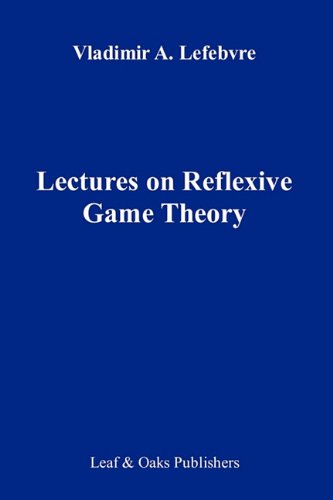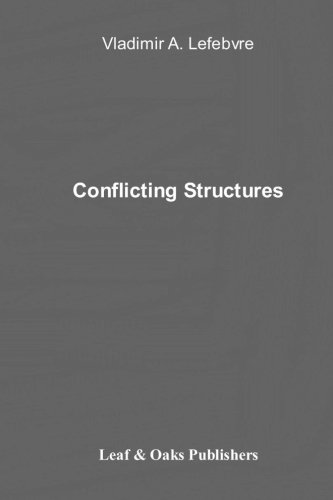Background
Lefebvre, Vladimir A. was born on September 22, 1936 in St. Petersburg, Union of the Soviet Socialist Republics. Came to the United States, 1974. Son of Alexander Voinov and Olga Lefevr.


(This book describes an innovative approach to reflexive g...)
This book describes an innovative approach to reflexive game theory. The applications of this theory include predicting and influencing choices made by individual subjects belonging to groups that have their own collective goals and interests. The correlation between a subject's individual interests and those of the group is informed by the anti-selfishness principle: a subject belonging to a group, in pursuing his or her own interests, may not cause harm to the interests of the group as a whole. This principle is as foundational to reflexive game theory as the principle of guaranteed results in classical game theory.
http://www.amazon.com/gp/product/0578065940/?tag=2022091-20

(This work aims to demonstrate that a universal model of m...)
This work aims to demonstrate that a universal model of man can be constructed using the precise mathematical formulation of a few philosophical theses about the nature of human beings. The author uses it to find theoretical solutions for several unexplained phenomena in psychophysics.
http://www.amazon.com/gp/product/0773492267/?tag=2022091-20

(The first edition of this book appeared in 1967 (in Russi...)
The first edition of this book appeared in 1967 (in Russian). In that edition, the author introduced two completely new concepts: that of a reflexive system (a system that has an image of the self) and that of reflexive control (conveying a basis for making the decision that is advantageous to the side conducting the reflexive control); both concepts have since become firmly established in modern theories of decision-making. The book contains the author's model of the Universe as a reflexive system (Janus-Cosmology) as well as the description of a device that turns fears into reality through reflexive control, constructed by the author for the purpose of experimental study. In addition, the author also explains how to use reflexive control over processes of reflexive control.
http://www.amazon.com/gp/product/0578157691/?tag=2022091-20
Lefebvre, Vladimir A. was born on September 22, 1936 in St. Petersburg, Union of the Soviet Socialist Republics. Came to the United States, 1974. Son of Alexander Voinov and Olga Lefevr.
Master of Science in Mathematics, Lomonosov State University, Moscow, 1968. Doctor of Philosophy in Psychology, Lomonosov State University, Moscow, 1971. Doctor honoris causa, International Information Academy, 2000.
He has created equations that are supposed to predict the large-scale consequences of individual actions. Among the parameters in the equations are the self image of the individual and the action as perceived via this self-image. The result is a number expressing the probability that the individual in question will perform a specific action.
Lefebvre"s mathematical approach to social psychology is often referred to as reflexive theory - presumably due to the "reflexive" nature of taking into account subjects" self-image(s).
Lefebvre developed Reflexive Theory as a military researcher in the former Soviet Union, where he was born and educated prior to coming to the United States. According to Jonathan Farley, a mathematician at Stanford doing applied work on national security issues, Lefebvre"s Reflexive Theory was a Soviet alternative to game theory which had been widely adopted by the American defense establishment.
(This work aims to demonstrate that a universal model of m...)
(This book describes an innovative approach to reflexive g...)
(The first edition of this book appeared in 1967 (in Russi...)
Sergeant Soviet Army, 1955-1958. Member American Association for the Advancement of Science, American Psychological Society, Society for Mathematics Psychology, International Society for Systems Studies, Russian Academy Natural Sciences (foreign member), New York Academy of Sciences, University California University Club.
Married Victorina Dubovskaya, April 26, 1959. 1 child, Andrei; 1 adopted child, Dung Le.
